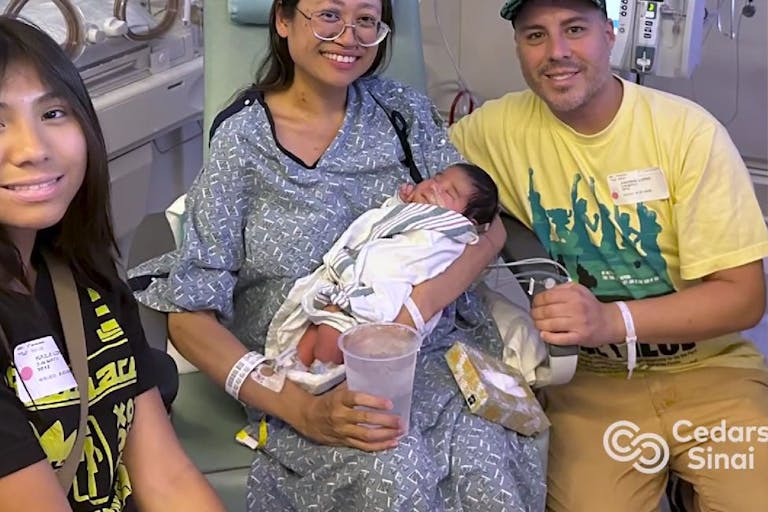
Full term 'miracle' baby born after 'unprecedented' ectopic pregnancy
Bridget Sielicki
·
Massachusetts bill would allow mothers to sell their own newborns to the highest bidder
On June 12, the Massachusetts House unanimously voted to pass a bill that would allow mothers to sell their newborns, and base parenthood solely on intent.
Currently, Massachusetts allows for paid surrogacy and traditional surrogacy, though in cases of traditional surrogacy, the intended parents must legally adopt the baby at birth, which would require a background check. At least one of the intended parents must have a genetic relationship to the child. H. 4672, the “Parentage Equality” bill, would redefine parenthood, changing it from its basis in biology or adoption (as a means of providing a home to a child who has lost his or her parents), to the basis of a “person’s intent to be a parent of a child.”
Opening the door to more abuse
Supporters of the bill argue that the current law has harmed same-sex couples (and intended parents who use an egg or sperm donor) because one of them is not legally the parent of the child conceived through a surrogate unless they have legally adopted the child. They complain that these couples have to “adopt their own children” to ensure their legal rights.
However, adoption protects children from abuse due to the regulations that are involved in the process. There is research on the negative outcomes for children who live with non-biologically related parental figures. One study found, “In studies across a wide range of cultures… [t]he single best predictor of child abuse is the presence of a stepparent in the home. In fact, the risk of even unintentional deaths, such as drowning, is greater in stepfamilies than in intact or single-parent families.”
Background checks exist in the adoption process to protect children from being placed in dangerous homes. With adoption, children are the clients and proper steps are taken to ensure children are placed with safe parents. With assisted reproductive technology (ART), adults are the clients and no laws require background checks for adults creating children through ART and surrogacy.
In a recent case, Adam Stafford King was arrested this year for allegedly planning to sexually abuse the baby boy he and his partner were expecting via surrogate. Background checks that are not required in surrogacy could have stopped Mark Newton and Peter Truong from sexually abusing a boy they paid a Russian woman to carry in 2005. Police believe they wanted to have a child “for the sole purpose of exploitation.” The boy’s abuse began just days after he was born and video shows Newton abusing him less than two weeks after his birth. The men traveled the world for more than six years, selling the boy for sex with at least eight men, recording the abuse, and uploading the footage to the “Boy Lovers Network.”
Selling biological children
According to The Federalist, most commercial surrogacy laws restrict surrogacy contracts to cases in which the surrogate is unrelated to the child she is carrying. However, the new Massachusetts bill would allow a biological mother to receive financial compensation in exchange for her biological baby, even allowing the surrogacy contract to be written after she has conceived a child.
Under the bill, the House voted to repeal Section 4B of Chapter 46 of Massachusetts law in regard to artificial insemination, which states, “Any child born to a married woman as a result of artificial insemination with the consent of her husband, shall be considered the legitimate child of the mother and such husband.” This would no longer be considered true under H. 47672.
In addition, Section 14 of the bill states, “…an action to establish parentage of a child may be instituted during pregnancy but shall only be filed by the person to give birth or their representative or by the IV-D agency as set forth in chapter 119A on behalf of the person to give birth.”
Article continues below
Dear Reader,
Have you ever wanted to share the miracle of human development with little ones? Live Action is proud to present the "Baby Olivia" board book, which presents the content of Live Action's "Baby Olivia" fetal development video in a fun, new format. It's perfect for helping little minds understand the complex and beautiful process of human development in the womb.
Receive our brand new Baby Olivia board book when you give a one-time gift of $30 or more (or begin a new monthly gift of $15 or more).
In other words, a woman can naturally become pregnant — by a partner or anyone else — and then decide to call that pregnancy a “surrogate” pregnancy in which she can be financially compensated for the child by an “intended parent.” She would be allowed to quite literally sell her own biological child.
The law would also allow surrogacy agreements in which the surrogate has sex with the intended father, allowing a man to pay a woman for sex, and then relinquish any conceived child to him, as long as a court approves it: Prostitution meets child trafficking.
The Federalist reported (emphases added):
Under H. 4672, the following would be perfectly legal: a woman undergoes the physical and mental health screenings required to become a surrogate, becomes pregnant via sperm from a sperm bank, and then posts to a surrogacy forum or social media group that she is not only available as a surrogate but already pregnant.
She could then choose to “match” with the couple [no background check legally required] willing to pay the highest “payment of consideration,” essentially auctioning off her child. As long as the surrogacy agreement meets the requirements outlined in the bill, it could be validated by a court and viewed as not only permissible but legally binding. However, if that same woman became pregnant and decided to make an agreement with a couple to adopt her child, while insisting that she be paid for placing her child with them, she would be prosecuted for baby selling.
People may see this as “far-fetched,” reported The Federalist, but it’s already happened in California where unrelated adults can be listed on a child’s birth certificate. In 2011, three women were convicted of operating an illegal baby-selling ring that they marketed as a surrogacy business. The three women included two attorneys who specialized in reproductive law and a woman who served as the “surrogacy facilitator.” Using their legal expertise, they were able to navigate around surrogacy laws that required surrogacy contracts to be in place before a pregnancy occurs.
According to the FBI, they sent surrogates to Ukraine to be implanted with embryos from anonymous individuals. The surrogates believed there was a list of parents waiting for babies and that the company was legitimate; however, the three women usually waited until the second or third trimester before finding intended parents for the babies. Those parents were lied to and told that the babies were part of legitimate surrogacy arrangements of which the original intended parents backed out. If they paid $100,000 to $150,000, they could have the baby. Less than half of the money went to the surrogates and the scheme went on for years.
Laws such as Massachusetts’ “Parentage Equality” bill are based on the false idea that an adult has a right to a child. Adults are not owed a child, and laws surrounding parenting must focus on the child’s right to a safe home and right to his or her biological parent and knowledge of his or her genetic background.
The bill now goes to the Senate for a vote.
Editor’s Note 6/19/24: Additional information was added to clarify the differences between IVF, surrogacy, and adoption.
Live Action News is pro-life news and commentary from a pro-life perspective.
Contact editor@liveaction.org for questions, corrections, or if you are seeking permission to reprint any Live Action News content.
Guest Articles: To submit a guest article to Live Action News, email editor@liveaction.org with an attached Word document of 800-1000 words. Please also attach any photos relevant to your submission if applicable. If your submission is accepted for publication, you will be notified within three weeks. Guest articles are not compensated (see our Open License Agreement). Thank you for your interest in Live Action News!

Bridget Sielicki
·
Human Interest
Bridget Sielicki
·
Issues
Nancy Flanders
·
International
Angeline Tan
·
Activism
Bridget Sielicki
·
Analysis
Angeline Tan
·
Issues
Nancy Flanders
·
Human Interest
Nancy Flanders
·
Investigative
Nancy Flanders
·
Pop Culture
Nancy Flanders
·
Human Interest
Nancy Flanders
·